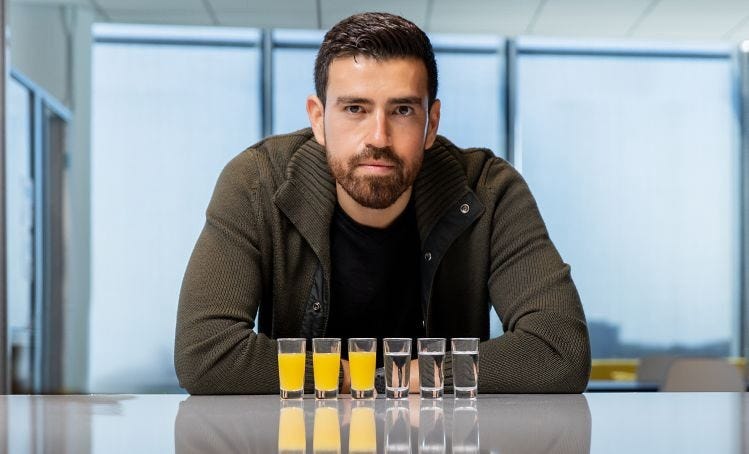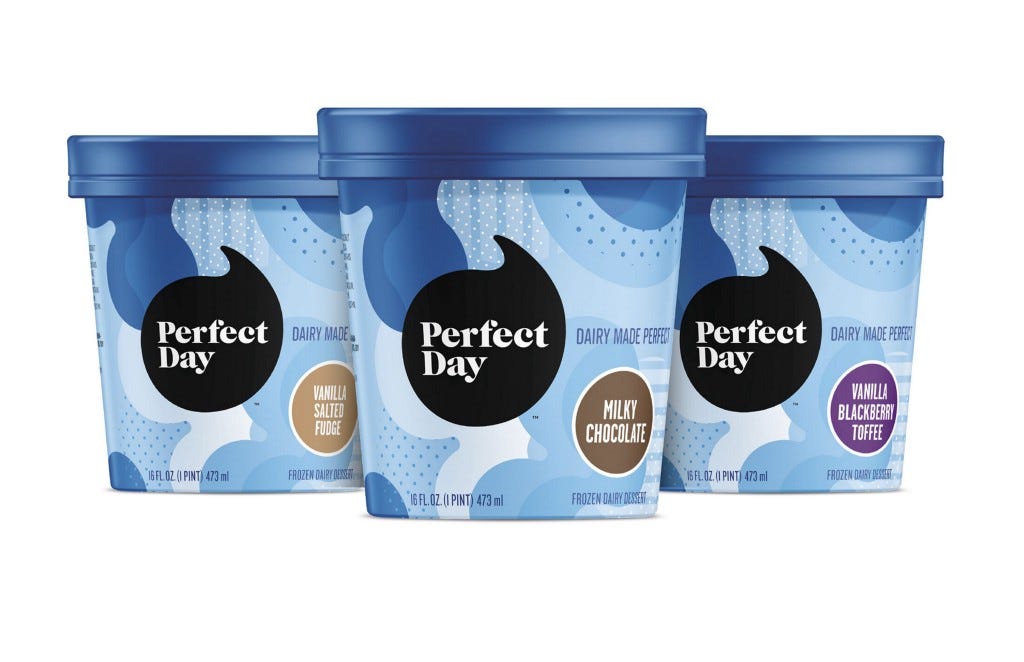One week in a post #20: The new Clara Foods, Starbuck buying into Syntactic Dairy Ice-Cream…
One week in a post #20: The new Clara Foods, Starbuck buying into Syntactic Dairy Ice-Cream, Vietnamese coffee, and Raw Dressings.
Now that climate beneficial eating is becoming more popular, and a number of individuals and organizations are getting into the space, I feel called to share with a broader audience what I encounter every single day through my work at Future Food and Food for Climate League. Weekly, I share startups I read about, products I tasted, founders I met (and a bit of personal life!). Every single concept I mention will be tracked on a public database we’re populating. The overarching goal is to increase the general interest in this topic, acknowledging that the challenge is too big not to work cooperatively.
This initiative is possible thanks to our amazing Future Food Ecosystem, where our team is working head-down every single day to research, design, create, and commercialize new food solutions to help our planet.
My word of the week
Vaccination. NOUN / treatment with a vaccine to produce immunity against a disease; inoculation.Food, Climate and Innovation: three highlights of the week
1/ Plant-based Egg Whites have launched
According to a study conducted by the Plant Based Foods Association, sales of plant-based foods increased by 90% during the pandemic and plant-based meat saw an even bigger 148% increase. While chicken nuggets and meat patties seem to draw most attention in the plant-based meat realm currently their is still innovation in other areas.
A San Francisco based food technology company, EVERY Company (originally Clara Foods), has launched the World’s First Animal-Free Egg Protein. Through fermentation, without involving animals, Elizondo and David Anchel, have developed a highly soluble, nearly invisible protein boost for use in food and beverage products.
Allowing for cleaner ingredient lists, founder Elizondo stated, “Now you can actually have plant-based milks that have more protein than cow milk without having to add all the corresponding sugar to mask that flavor, or all these gums to keep it soluble, because plant proteins are just notoriously insoluble.”
The EVERY Company has already launched their plant-based pepsin. And we all may be wondering what is the value in developing a plant-based pepsin? Traditionally sourced from the stomach lining of pigs, pepsin, an enzyme, has been used as an ingredient in food products, including chewing gum, cheeses, and to provide whipping qualities to gelatin and soy protein. Environmentally, the fermentation technology uses a fraction of the water and land and emits far less greenhouse gases than current large-scale factory farms.
While it’s easy to notice new plant-based proteins such as faux patties, nuggets, or sausages, it’s exciting to see innovation for alternatives that will make even more basic products plant-based.
2/ The power of “Moments of Consumption” and Creating New Flavor Experiences
Morning Snack, Lunch, Afternoon Munchies… there’s various moments of consumption throughout the day. Sometimes you crave savory, sometimes you crave sweet. Brands are looking to branch out and appeal to more than just their designated moments of consumption.
While brands such as Hershey have stereotypically appealed to more afternoon or post-dinner indulgent moments, they are looking to create more opportunities for their consumers throughout the day. According to Dan Mohnshine, head of strategic growth platforms at Hershey, the company “sees this as a potential growth lever and way for us to potentially capture more total snacking occasions across all day-parts.”
Based on consumer research, they are able to understand and to meet consumer demand with the flavor variations and formats that appropriately fit the time of day. The company last year launched Reese’s Snack Cakes, a mid-morning snack, featuring a soft-baked chocolate cake topped with peanut butter crème and covered in milk chocolate.
Other innovations include the launch of the Reese’s snack bar which offers more satiation to consumers looking for a filling snack while they work. Along with Reese’s, the company is experimenting with the familiar household name, KitKat. Recent additions include KitKat Duos Mint + Dark Chocolate and KitKat Duos Mocha + Chocolate, plus a range of limited-edition flavors like birthday cake, pumpkin pie, raspberry crème, apple pie and lemon crisp.
Can we now use these learnings to boost climate beneficial foods, please?
3/ Synthetic dairy Ice-cream at Starbucks?
Yes, you read that right. Starbucks is currently testing a drink with ice cream made by Perfect Day Inc., which makes synthetic dairy products in Palm Springs, California.
Starbucks, one of the world’s most familiar and largest restaurant operations, has worked relentlessly towards becoming more environmentally friendly: Oatly AB’s dairy alternative is now available in its cafes across the U.S. In Chile, the coffee chain is serving plant-based meat and milk from NotCo SpA. They are also testing vegan whipped cream, made from a base of lentils, at two locations in Washington state.
However, what is more shocking is the experimentation with brand Perfect Day, a Berkeley, California-based startup, labeled as “the world’s first animal-free milk protein”, who offer a different style of plant-based product Starbucks has not experimented with yet. It uses genetically modified microflora — specifically a strain of fungus — that’s modified with a digital copy of bovine DNA to produce dairy proteins that can be used in foods such as ice cream and cream cheese.
This is only the start of more plant-based substitutions at Starbucks, as they are working towards expanding their options: “Building on Starbucks sustainability commitment, the company’s goal is to expand plant-based choices as an environmentally friendly menu contributes to our goal to be a resource positive company,” a Starbucks spokesperson told VegNews.
Go Perfect Day, go!!
Climate Friendly products of the week
Copper Cow Coffee
Copper Cow Coffee is a women-owned and led team on a mission to sustainably support and share the vibrant heritage of Vietnamese coffee.
Sustainably Sourced / Copper Cow Coffee has an active relationship with their farmers in Vietnam, plus every step of our supply chain. Their farmers are paid 2x market rate to ensure a higher quality of life and the most delicious coffee they can produce.
Convenience / In 90 seconds, their single serve filters will brew a rich Vietnamese-style cup of coffee.
Women-Own / Debbie Mullin is the power house behind this brand!
Mother Raw
Mother Raw sells plant-based & organic dressings, dips, queso & condiments.
Nutrition / Not only are Mother Raw products plant-based & organic, they also never apply heat in the cooking process in order to allow the full nutritional value to be utilized. They also strictly avoid all artificial and processed flavors, colors and fillers.
Sustainability / Organic, non-GMO and plant-based, Mother Raw products are sold in 100% recyclable glass containers.
Market / The dressing space, has seen (generally speaking) less crazy innovations than others.
Lesser Evil
Lesser Evil creates affordable snacks that integrate healthy and sustainably sourced ingredients.
Sustainability / Lesser Evil minimizes their footprint by using organic inputs, composting their food waste, and using more environmentally friendly packaging.
Branding / Lesser Evil has three wellness gurus with unique characteristics that represents each of their lines “Homer” for Organic Popcorn, “Henry” for Paleo Puffs, and “Atlas” for Power Curls.
Focus on Quality / Lesser Evil pays up to 2.5 times more for raw materials (like their organic popcorn) than their competitors, owning their own factory and warehouse allows us to sell their organic products at similar prices to those of conventional manufacturers.
The Future Food Institute believes climate change is at the end of your fork. By harnessing the power of our global ecosystem of partners, innovators, researchers, educators, and entrepreneurs, FFI aims to sustainably improve life on Earth through the transformation of global food systems. Learn more at www.futurefoodinsitute.org, or join the conversation on Facebook, Instagram, Twitter, LinkedIn, or YouTube. Or attend a program through the FutureFood.Academy!
Can I help you with the work you’re doing? Please reach out to me here!
👉👉 Thank you Natalie Brandenburg for the priceless help putting this article together!
One week in a post #20: The new Clara Foods, Starbuck buying into Syntactic Dairy Ice-Cream… was originally published in FUTURE FOOD on Medium, where people are continuing the conversation by highlighting and responding to this story.






